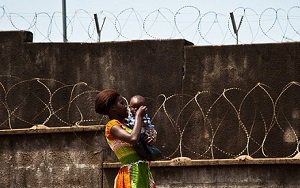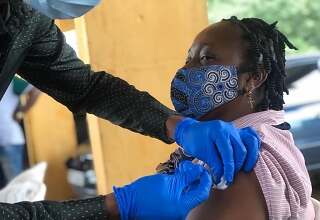
Criminal Justice Reforms in Sierra Leone: A Path to Justice and Equality
Tamba Eric Sourie – Chief Executive
Initiative for Criminal Justice Reforms in Sierra Leone – ICJR
Criminal justice reforms in Sierra Leone have been a critical pathway toward achieving justice and equality in the country. These reforms have aimed to address longstanding issues, enhance the rule of law, protect human rights, and promote fairness within the criminal justice system. This small West African Nation once marred by a brutal civil war and plagued by deep-rooted social issues, has been making significant strides in recent years to reform its Criminal Justice system. These reforms are geared towards addressing the systemic challenges that have hindered the country’s progress toward justice, accountability, and equality.
Criminal justice reforms in Sierra Leone have been vital in promoting justice and equality, but challenges remain. Continual commitment from the government, civil society, and international partners is crucial to sustaining these reforms and ensuring that they lead to lasting improvements in the country’s justice system. While significant progress has been made, Sierra Leone still faces challenges in its journey towards achieving justice and equity in the Criminal justice system. Persistent issues include resource constraints, corruption, and the need for continued capacity building. Ongoing commitment from the government, civil society, and international partners is essential to ensure that these reforms are sustained and that justice and equity are upheld for all Sierra Leoneans.
Historical Context:
Sierra Leone’s history is marked by a brutal civil war (1991 – 2002) that left a trail of devastation and trauma. The conflict exposed serious flaws in the country’s criminal justice system, there-by culminating to widespread impunity and an erosion of trust in the judicial process. During the start of the post conflict, Sierra Leone embarked on a journey of recovery, reconciliation, and reform, with the reform of the Criminal Justice system being a central pillar of this transformation.
The Sierra Leone Criminal Justice System, like many others around the globe, may require various reform strategies to ensure it is fair, efficient, and effective. Key areas that typically require attention and reforms in our criminal justice system:
Overcrowded Correctional Centers: Overcrowding in our Correctional Centers can result to inhumane conditions, exacerbate issues such as disease spread, and hinder rehabilitation efforts. Reform efforts should focus on minimizing the Correctional centers population through alternative sentencing and bail reforms. The problem of overcrowding in correctional centers in Sierra Leone is a significant and longstanding issue that has been a cause for concern for many years. Several factors contribute to this problem: Inadequate infrastructure, High incarceration rates, pre-trial detention, Lengthy court processes, inadequate legal representation, Resource constraints, and also lack of rehabilitation programs. The focus of the correctional system in Sierra Leone has historically been on punishment rather than rehabilitation. Without effective rehabilitation programs, many individuals reoffend after their release, leading to a revolving door of incarceration.
Addressing overcrowding in correctional centers in Sierra Leone is a complex and multifaceted challenge that requires a coordinated effort from the government, civil society organizations, and international partners. It involves legal reforms, infrastructure improvements, and a focus on rehabilitation and reintegration to ensure a more effective and humane criminal justice system.
Access to Legal Representation: Many individuals in Sierra Leone lack access to legal representation, leading to unequal access to justice. Reforms should aim to provide legal aid to those who cannot afford it and improve the quality of legal representation for all. Improving access to legal representation in Sierra Leone’s criminal justice system is essential to upholding the rule of law and ensuring fair and just legal proceedings for all individuals, regardless of their financial means or location. It requires a concerted effort from the government, legal organizations, and civil society to address the existing challenges and promote access to justice.
Delays in Case Processing: Lengthy pre-trial detention and slow case processing can lead to a backlog of cases and infringe on the rights of the accused. Reforms may include improving the efficiency of the court system, setting strict time limits for trials, and promoting alternative dispute resolution mechanisms. Sierra Leone’s criminal justice system has historically experienced a backlog of cases. This backlog can lead to significant delays in the processing of cases, with some cases taking years to be resolved.
Police Accountability: Ensuring that law enforcement agencies are accountable for their actions is crucial. This includes addressing issues of police brutality, corruption, and excessive use of force through training, oversight, and legal mechanisms. Sierra Leone has established independent oversight bodies to monitor and investigate allegations of police misconduct and abuse. The Independent Police Complaints Board (IPCB) is one such institution responsible for receiving and investigating complaints against police officers. The IPCB’s mandate includes ensuring transparency and accountability within the police force. However, despite these efforts, challenges remain. These challenges include delays in the resolution of complaints, lack of resources for oversight bodies, and the need for further reforms to enhance accountability and transparency.
In another case-in-point, engaging with communities can serve as an important element of police accountability. Building trust between the police and the community can lead to more effective policing and increased accountability. Also, efforts must be made to provide training to police officers on human rights, ethics, and professional conduct. Sensitization programs aim to promote a culture of accountability and respect for the rule of law within the police force.
Juvenile Justice System: The treatment of juvenile offenders should focus on rehabilitation rather than punishment. Reforms should include specialized courts and programs tailored to the needs of young offenders. However, Sierra Leone faces resource constraints, including financial limitations and shortages of trained personnel, which can affect the functioning of the juvenile justice system. Insufficient funding can impact the quality of services and support available to juvenile offenders. Moreover, while rehabilitation is a key goal of the juvenile justice system, there may be shortcomings in the availability and quality of rehabilitation programs, including counseling, education, and vocational training. Additionally, while juveniles have the right to legal representation, many may not have access to legal services due to financial constraints or limited availability of legal aid.
Bail System: A fair and efficient bail system is essential to prevent unnecessary pre-trial detention. Reform efforts should ensure that bail is set at reasonable levels and that indigent individuals are not held in detention solely due to an inability to pay. In Sierra Leone, like in many other countries, the right to bail is recognized as a fundamental right. Generally, individuals accused of non-capital offenses are eligible for bail. However, bail may be denied in certain circumstances, such as when there is a risk that the accused may flee, tamper with evidence, or pose a threat to public safety. To obtain bail in Sierra Leone, a person typically has to make a formal application to the court. This involves providing information about the accused’s background, the nature of the charges, and often, sureties or guarantors who are willing to take responsibility for ensuring the accused appears in court for their trial. When granting bail, the court may impose certain conditions on the accused. These conditions can vary but often include reporting to a police station at specified times, surrendering travel documents, or staying away from specific places or individuals. Violating bail conditions can lead to the revocation of bail. The court will determine the bail amount based on several factors, including the seriousness of the offense, the accused’s criminal record, and the risk they may pose if released. The purpose of bail is not to punish the accused but to ensure their appearance at trial.
Mental Health and Drug Treatment: The criminal justice system should consider diversion programs for individuals with mental health issues or substance abuse problems, emphasizing treatment over incarceration. Sierra Leone, like many other countries, has faced significant challenges in addressing mental health issues. The civil war, which lasted from 1991 to 2002, had a profound impact on the mental health of the population. There is a high prevalence of trauma-related disorders among the population. In the past, mental health services in Sierra Leone’s detention facilities have been often inadequate, and inmates with mental health issues did not receive proper care and support. There is limited access to psychiatric medication and trained mental health professionals. The issue of drug addiction and substance abuse is of significant concern in Sierra Leone, particularly in urban areas. However, the availability of drug treatment programs within the criminal justice system is limited or almost unavailable.
It is important to note that addressing mental health and drug treatment in the criminal justice system is a complex and ongoing process that requires coordination among various government agencies, civil society organizations, and international partners.
Community Policing: Encouraging community engagement and cooperation with law enforcement can help build trust and reduce crime. Reforms might include training for police officers in community policing techniques. Community policing in Sierra Leone’s criminal justice system is an ongoing effort to rebuild trust, enhance safety, and address the unique challenges faced by a post-conflict society. It emphasizes collaboration, problem-solving, and community engagement as essential components of effective law enforcement. Community policing in Sierra Leone is guided by principles that emphasize community engagement, partnership, and problem-solving
Sierra Leone experienced a brutal civil war from 1991 to 2002, which had devastating effects on the country’s institutions and infrastructure. The war highlighted the need for significant reforms in the security and justice sectors, including the police. After the civil war, Sierra Leone underwent a period of post-conflict reconstruction, during which significant efforts were made to rebuild the police force and restore law and order. Police officers are encouraged to actively engage with community members, listen to their concerns, and build positive relationships. This involves community meetings, dialogues, and open communication channels. The Police force works closely with communities to identify and address the root causes of crime and disorder. They collaborate with local stakeholders to develop strategies for crime prevention and reduction. Also, the police work in partnership with other government agencies, non-governmental organizations, and community-based organizations to address social issues contributing to crime, such as youth unemployment and drug abuse. Building trust between the police and communities is a core goal. This is achieved by ensuring accountability, transparency, and responsiveness in policing activities.
Corruption and Bribery: Addressing corruption within the criminal justice system is essential for its integrity. Measures should be taken to ensure the ethical conduct of judges, prosecutors, and law enforcement officers. Corruption and bribery have been long-standing challenges within the Sierra Leonean criminal justice system. While there have been efforts to combat these issues, they continue to persist to varying degrees. Here are some key points to understand about corruption and bribery in Sierra Leone’s criminal justice system:
Sierra Leone has a history of corruption and bribery within its institutions, including the criminal justice system. This is partly due to the legacy of a decade-long civil war (1991-2002) that destabilized the country and contributed to the erosion of institutions. One contributing factor to corruption in the justice system is the low salaries of law enforcement officers, judges, and other personnel. This financial strain can make these individuals more susceptible to bribery and other forms of corruption. Police officers in Sierra Leone have been known to engage in corrupt practices such as demanding bribes from citizens during routine stops or investigations. This can hinder the delivery of justice and erode public trust in law enforcement. There have been cases of judicial corruption in Sierra Leone, with allegations of judges taking bribes to influence the outcomes of cases. This undermines the fairness and integrity of the legal system. Also, delays and inefficiencies in the legal system can create opportunities for corruption. Individuals may be willing to pay bribes to expedite their cases or secure favorable outcomes.
In recent years, Sierra Leone made efforts to combat corruption. The Anti-Corruption Commission (ACC) was established to investigate and prosecute cases of corruption. The ACC has taken action against several high-profile individuals, including politicians and public officials. However, despite the establishment of anti-corruption agencies, there are challenges in enforcing anti-corruption laws, and political interference can hinder the prosecution of corrupt individuals. Apparently, there is a growing awareness among the Sierra Leonean public about the negative impact of corruption on society, and there have been calls for greater transparency and accountability. Against this backdrop, addressing corruption and bribery in the Sierra Leonean criminal justice system requires not only law enforcement efforts but also broader reforms, including improving salaries for justice sector personnel, streamlining legal processes, and promoting a culture of integrity and accountability.
Victim Support Services: Supporting and empowering victims of crime is crucial. Reforms should focus on providing victims with information, counseling, and compensation where appropriate. Sierra Leone has enacted laws and policies aimed at protecting the rights of victims within the criminal justice system. The 2012 Sexual Offences Act, for example, contains provisions for the protection of victims of sexual violence.
The Sierra Leone Police, in collaboration with various partners, has established Victim and Witness Support Units in key locations. These units are tasked with providing support and assistance to victims and witnesses of crimes, particularly in cases of sexual and gender-based violence. This country has experimented with restorative justice programs, particularly in addressing issues related to the aftermath of the civil war. These programs aim to reconcile victims and offenders and promote healing within communities affected by violence.
The Sierra Leonean government, with assistance from international organizations, has made efforts to strengthen the criminal justice system’s capacity to support victims. This includes training law enforcement personnel, judges, and prosecutors in handling cases with sensitivity to victims’ needs. However, despite these efforts, there are still challenges in providing comprehensive victim support services in Sierra Leone. These challenges include resource constraints, limited access to justice in rural areas, and the need for further awareness and education regarding victims’ rights.
Conclusion
It is significant to note that specific challenges and priorities may vary over time and across different regions within Sierra Leone. Reforms should be tailored to address the unique needs and circumstances of the country’s criminal justice system, with input from legal experts, civil society organizations, and affected communities. Additionally, ongoing monitoring and evaluation are essential to assess the impact of reforms and make necessary adjustments.














